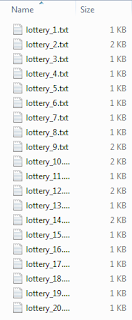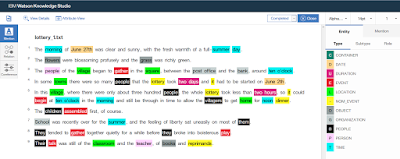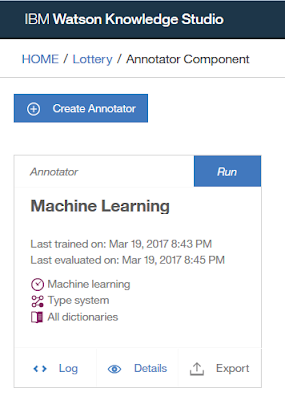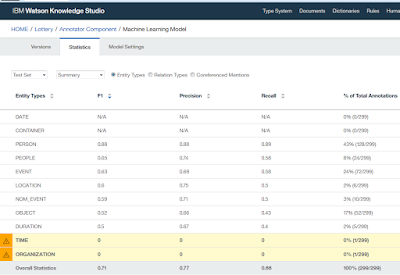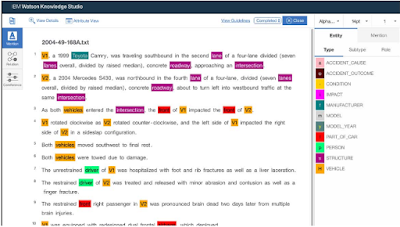I'm participating in the Startup Weekend event in Chico CA sponsored by Chicostart.
Great first night. The 60 second pitches were awesome. So much variety
and interesting problems to solve. I pitched my own idea about using
Watson to identify fake news, but I only got two blue stickers, boo hoo. I am very impressed with the Build.com space that hosted us. They are
a multi-use space that includes a lot of tech startups. Kudos for
putting such a great state-of-the-art space in a small college town.
Saturday, March 25, 2017
Friday, March 24, 2017
Chico Startup Weekend
I'm looking forward to participating in Chico Startup Weekend, sponsored by Chicostart. I can't say what the weekend holds, but it's nice to know there's this kind of energy and drive in small town America. Startups ain't just for Austin and Mountain View.
Monday, March 20, 2017
Using IBM Watson Knowledge Studio to Train Machine Learning Models
Using the Free Trial version of IBM's Watson Knowledge Studio, I just annotated a text and created a machine learning model in about 3 hours without writing a single line of code. The mantra of WKS is that you don't program Watson, you teach Watson.
For demo purposes I chose to identify personal relationships in Shirley Jackson's 1948 short story The Lottery. This is a haunting story about a small village and its mindless adherence to an old, and tragic tradition. I chose it because 1) it's short and 2) it has clear person relationships like brothers, sisters, mothers, and fathers. I added a few other relations like AGENT_OF (which amounts to subjects of verbs) and X_INSIDE_Y for things like pieces of paper inside a box.
WORK FLOW
I spent about 30 minutes prepping the data. E.g., I broke it into 20 small snippets (to facilitate test/train split later), I also edited some quotation issues, spelling, etc).
It uploaded into WKS in seconds (by simply dragging and dropping the files into the browser tool). I then created a Type System to include entity types such as these:
And relation types such as these:
I then annotated the 20 short documents in less than two hours (as is so often the case, I re-designed my type system several times along the way; luckily WKS allows me to do this fluidly without having to re-annotate).
Here's a shot of my entity annotations:
Here's a shot of my relation annotations:
I then used these manually annotated documents as ground truth to teach a machine learning model to recognize the relationships automatically using a set of linguistic features (character and word ngrams, parts-of-speech, syntactic parses, etc). I accepted the WKS suggested split of documents as 70/23/2:
I clicked "Run" and waited:
The model was trained and evaluated in about ten minutes. Here's how it performed on entity types:
And here's how it performed on relation types:
This is actually not bad given how sparse the data is. I mean, an F1 of .33 on X_INSIDE_Y from only 29 training examples on a first pass. I'll take it, especially since that one is not necessarily obvious from the text. Here's one example of the X_INSIDE_Y relation:
So I was able to train a model with 11 entity types and 81 relation types on a small corpus in less than three hours start to finish without writing a single line of code. I did not program Watson. I taught it
For demo purposes I chose to identify personal relationships in Shirley Jackson's 1948 short story The Lottery. This is a haunting story about a small village and its mindless adherence to an old, and tragic tradition. I chose it because 1) it's short and 2) it has clear person relationships like brothers, sisters, mothers, and fathers. I added a few other relations like AGENT_OF (which amounts to subjects of verbs) and X_INSIDE_Y for things like pieces of paper inside a box.
Caveat: This short story is really short: 3300 words. So I had no high hopes of getting a good model out of this. I just wanted to go through an entire machine learning work flow from gathering text data to outputting a complete model without writing a single line of code. And that's just what I did.
WORK FLOW
I spent about 30 minutes prepping the data. E.g., I broke it into 20 small snippets (to facilitate test/train split later), I also edited some quotation issues, spelling, etc).
It uploaded into WKS in seconds (by simply dragging and dropping the files into the browser tool). I then created a Type System to include entity types such as these:
And relation types such as these:
I then annotated the 20 short documents in less than two hours (as is so often the case, I re-designed my type system several times along the way; luckily WKS allows me to do this fluidly without having to re-annotate).
Here's a shot of my entity annotations:
Here's a shot of my relation annotations:
I then used these manually annotated documents as ground truth to teach a machine learning model to recognize the relationships automatically using a set of linguistic features (character and word ngrams, parts-of-speech, syntactic parses, etc). I accepted the WKS suggested split of documents as 70/23/2:
I clicked "Run" and waited:
The model was trained and evaluated in about ten minutes. Here's how it performed on entity types:
And here's how it performed on relation types:
This is actually not bad given how sparse the data is. I mean, an F1 of .33 on X_INSIDE_Y from only 29 training examples on a first pass. I'll take it, especially since that one is not necessarily obvious from the text. Here's one example of the X_INSIDE_Y relation:
So I was able to train a model with 11 entity types and 81 relation types on a small corpus in less than three hours start to finish without writing a single line of code. I did not program Watson. I taught it
Thursday, March 9, 2017
Annotate texts and create learning models
IBM Watson has released a free trial version of their online Watson Knowledge Studio tool. This is one of the tools I'm most excited about because it brings linguistic annotation, rule writing, dictionary creation, and machine learning together in a single user-friendly interface designed for non engineers to use.
This tool allows users to annotate documents with mentions, relations, and coreference, then learn a linguistic model of their environments. With zero computer science background. I've trained subject matter experts in several fields to use the WKS and I'm genuinely impressed. I'll put together a demo and post it sometime this weekend.
This tool allows users to annotate documents with mentions, relations, and coreference, then learn a linguistic model of their environments. With zero computer science background. I've trained subject matter experts in several fields to use the WKS and I'm genuinely impressed. I'll put together a demo and post it sometime this weekend.
Subscribe to:
Comments (Atom)
TV Linguistics - Pronouncify.com and the fictional Princeton Linguistics department
[reposted from 11/20/10] I spent Thursday night on a plane so I missed 30 Rock and the most linguistics oriented sit-com episode since ...
-
[reposted from 11/20/10] I spent Thursday night on a plane so I missed 30 Rock and the most linguistics oriented sit-com episode since ...
-
Matt Damon's latest hit movie Elysium has a few linguistic oddities worth pointing out. The film takes place in a dystopian future set i...
-
Bob Carpenter recently made the following comment on one of my posts: I'm very excited to hear that linguists are beginning to take sta...





